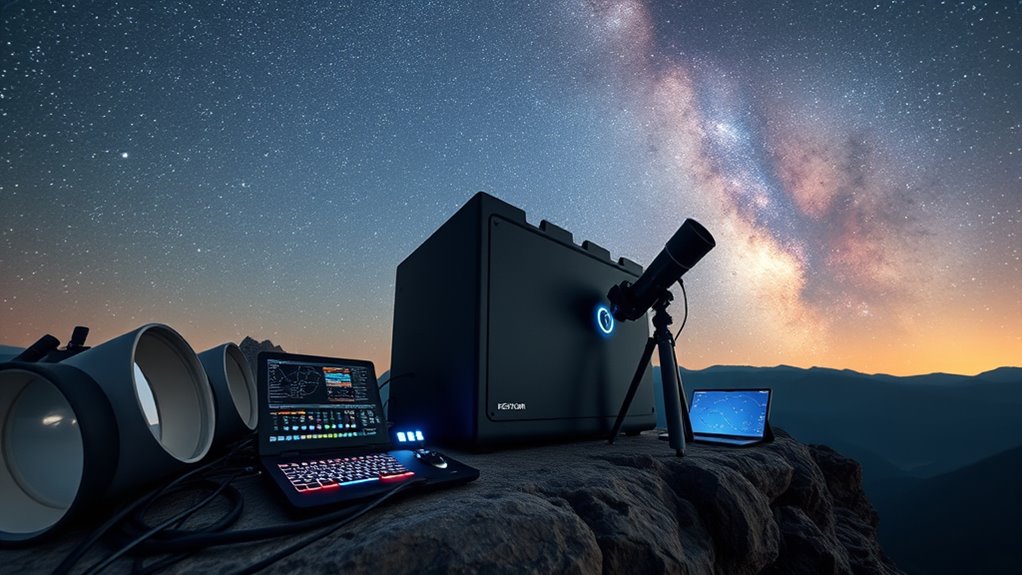If you’re looking for the best portable power stations for stargazing, I recommend options that are lightweight, versatile, and have enough capacity to power telescopes, cameras, and more. Devices like the OUPES Mega 1, MARBERO, and Jackery Explorer 240 offer great features like fast recharging, multiple outlets, and safety protections. They’re designed for outdoor use and easy to carry on your adventures. Keep exploring to find the perfect fit for your stargazing needs.
Key Takeaways
- Prioritize lightweight, compact power stations under 9 inches for easy portability during outdoor stargazing trips.
- Choose units with 200W–300W continuous power and multiple outlets (USB-C, AC) to support telescopes and electronic devices.
- Ensure models support fast recharging via AC, car, or solar, with at least 55-minute quick recharge capabilities.
- Select stations with safety features like BMS, surge protection, and certifications to safely power sensitive astronomy equipment.
- Opt for units with built-in LED lights or SOS modes for nighttime visibility and emergency use during outdoor adventures.
HOWEASY Portable Power Station (88Wh Solar Generator)
If you’re looking for a compact, reliable power source for outdoor astronomy sessions, the HOWEASY Portable Power Station is an excellent choice. Its 88Wh lithium battery provides enough juice to run essential devices like small telescopes, LED lights, and chargers. With 8 versatile ports—including AC, USB-C, QC 3.0 USB, and DC outlets—it supports multiple devices simultaneously. The LED display keeps you informed about power levels and operation status. Lightweight at just 2.3 pounds and featuring a hidden handle, it’s easy to carry on camping trips or emergency outings. Recharging options include AC, solar, and car socket, ensuring flexibility wherever you go.
Best For: outdoor enthusiasts, campers, and emergency preparedness individuals seeking a compact, reliable portable power source for small devices and outdoor activities.
Pros:
- Lightweight (2.3 pounds) and portable with a hidden handle for easy carry
- Multiple charging options including AC, solar, and car socket for versatile recharging
- Supports multiple devices simultaneously with 8 versatile ports and an LED display for monitoring
Cons:
- Limited to 88Wh capacity, suitable mainly for low-power devices below 150W
- Solar panel not included, requiring an additional purchase for solar recharging
- Output power (150W peak) may not support high-wattage appliances or heavy-duty equipment
Portable Power Station, 288Wh LiFePO4 Battery, 600W Solar Generator
The Portable Astronomy Power Station with its 288Wh LiFePO4 battery and 600W solar generator is perfect for outdoor enthusiasts and emergency preparedness. It can power up to 8 devices simultaneously with a total output below 600W, making it ideal for camping, hiking, or RV trips. Its multiple ports include AC outlets, USB-C PD, USB-A, and DC5521, supporting devices like laptops, drones, and CPAP machines. Charging is flexible—via wall outlet in 1.7 hours, car in 3 hours, or solar in 3-4 hours. Its lightweight design and built-in LED light with SOS mode ensure you’re ready for any outdoor adventure or unexpected outage.
Best For: outdoor enthusiasts, campers, RV travelers, and emergency preparedness individuals needing reliable portable power.
Pros:
- Lightweight and compact design for easy portability
- Supports multiple devices simultaneously with diverse output ports
- Fast charging options including wall, car, and solar
Cons:
- Limited total power output of 600W may restrict larger appliances
- Solar charging depends on sunlight conditions and panel capacity
- Slightly higher price point due to advanced battery technology
Portable Power Station 300W (GRECELL 230.88Wh Solar Generator)
For outdoor enthusiasts and amateur astronomers, the GRECELL 300W Solar Generator stands out as a reliable, portable power source that keeps your devices charged during nighttime stargazing or extended camping trips. With a capacity of 230.88Wh and a continuous 330W output, it supports laptops, cameras, lights, and small appliances under 330W. Its compact design (7.3 pounds) makes it easy to carry, featuring six versatile outlets, including USB-C PD 60W for fast charging. Recharging is flexible—via AC, solar, or car outlet—and the built-in MPPT guarantees efficient solar energy use. It’s a dependable choice for powering your gear in the great outdoors.
Best For: outdoor enthusiasts, campers, and amateur astronomers needing reliable, portable power to charge small devices during outdoor activities or extended trips.
Pros:
- Compact, lightweight design (7.3 pounds) for easy portability and outdoor use.
- Multiple output options including AC, USB-C PD 60W, and USB-A QC 15W for versatile device charging.
- Supports efficient recharging via AC, solar with MPPT, or car outlet, making it flexible for various scenarios.
Cons:
- Limited input power (150W), which may result in slower recharging with larger chargers.
- Not suitable for high-wattage appliances such as heating devices or large kitchen appliances.
- Battery capacity (230.88Wh) may require multiple charges or limit usage duration for power-intensive devices.
Jackery Explorer 240 v2 Portable Power Station
The Jackery Explorer 240 v2 Portable Power Station stands out as an ideal choice for amateur astronomers and outdoor enthusiasts who need reliable, portable energy on the go. It features a 256Wh LiFePO4 battery rated for over 3,000 charge cycles and a 10-year lifespan, ensuring long-term use. Weighing just 6.6 pounds, it’s compact enough for easy transport. With a 300W AC outlet, multiple USB ports—including 100W PD USB-C—and fast charging options, it supports powering essential devices like lights, small appliances, and electronics. Its robust safety certifications and built-in camping light make it a versatile, dependable power source for stargazing adventures.
Best For: outdoor enthusiasts, amateur astronomers, and emergency preparedness users who require reliable portable power for short-term use during outdoor activities, camping, or power outages.
Pros:
- Compact and lightweight design (6.6 pounds) for easy portability
- Long-lasting LiFePO4 battery with over 3,000 charge cycles and 10-year lifespan
- Multiple charging options, including AC, solar, and car outlet, with fast charging capabilities
Cons:
- Limited 300W AC power output may not support larger appliances
- Requires specific adapters for solar panel compatibility
- No higher capacity options integrated into this model for extended power needs
OUPES Mega 1 Portable Power Station (1024Wh)
If you’re looking for a reliable power solution that can handle high-watt appliances during outdoor astronomy sessions, the OUPES Mega 1 Portable Power Station is an excellent choice. It packs a 1024Wh LiFePO4 battery, with expandability up to 5120Wh by adding extra batteries, surpassing most competitors. It delivers a continuous 2000W AC output, enough to run refrigerators, CPAPs, or multiple devices simultaneously. Charging options include solar, AC, or car, with fast recharge times. Its durable, compact design weighs just 27.8 pounds, and features multiple outlets, smart app control, and quick switching to UPS mode—making it perfect for stargazing adventures or backup power.
Best For: outdoor enthusiasts, emergency backup users, and professionals needing reliable, expandable power for high-watt appliances during outdoor activities or power outages.
Pros:
- High capacity of 1024Wh with expandability up to 5120Wh for extended power needs
- Powerful 2000W continuous AC output capable of running large appliances like refrigerators and CPAP machines
- Fast recharging options with dual charging speeds and smart app control for monitoring
Cons:
- Weight of 27.8 pounds may affect portability for some users
- Higher initial cost compared to smaller or less capable portable power stations
- Limited battery capacity if not expanded, which may require additional units for prolonged use
EnginStar Portable Power Station 300W 296Wh Battery Bank
When I need reliable power on outdoor astronomy adventures, the EnginStar Portable Power Station 300W stands out with its 296Wh capacity and lightweight design. Weighing just 6.5 pounds, it’s easy to carry and fits easily into my gear. It features two AC outlets, USB-C, and multiple USB ports, making it versatile for powering telescopes, laptops, or cameras. Its built-in digital display keeps me informed about battery status, and the safety features protect my devices during use. Recharging is straightforward via solar, wall, or car, ensuring I stay powered in remote locations. Overall, it’s a compact, dependable solution for stargazing on the go.
Best For: outdoor enthusiasts, campers, and astronomers needing reliable, portable power to run sensitive devices in remote or off-grid locations.
Pros:
- Lightweight and compact design weighing only 6.5 pounds for easy portability.
- Multiple charging options including solar, wall, and car socket for versatile recharging.
- Safe operation with built-in protections, digital display, and real-time battery monitoring.
Cons:
- May experience overheating issues or unexpected shutdowns as reported by some users.
- Limited 300W maximum output, which may not support high-power appliances.
- Battery capacity of 296Wh might require frequent recharging during extended use.
VTOMAN Jump 600X Portable Power Station
For anyone venturing into stargazing or astrophotography, the VTOMAN Jump 600X Portable Power Station stands out as a reliable power partner. Weighing just 13.2 pounds, it delivers 600W continuous power with a 299Wh LiFePO4 battery, expandable to 939Wh. Its compact design includes multiple ports—AC outlets, USB-C, DC, and a car socket—letting you power various devices simultaneously. The built-in LED light and safety features, like over-charge and high-temperature protection, add convenience and peace of mind. Whether off-grid, camping, or during an emergency, this station provides dependable, safe power for your astronomy gear.
Best For: outdoor enthusiasts, campers, and astrophotographers seeking a reliable, portable power source for their sensitive devices and equipment during off-grid adventures.
Pros:
- Compact, lightweight design weighing only 13.2 pounds for easy portability
- Safe and long-lasting LiFePO4 battery with extensive cycle life and built-in safety protections
- Multiple output options including AC, USB-C, DC, and car socket for powering various devices simultaneously
Cons:
- Expandable battery requires purchasing separately, adding to overall cost
- Limited 299Wh capacity may not support prolonged power needs without expansion
- No dedicated wireless charging or higher wattage AC outlets beyond 600W continuous power
OUPES Exodus 1200 Portable Power Station
Looking for a reliable power source that can keep your astronomy gear running during extended stargazing sessions or outdoor expeditions? The OUPES Exodus 1200 delivers with a massive 992Wh capacity, powering a fridge for over 25 hours and charging phones 60+ times. Its 1200W rated outlets handle high-drain devices like projectors and small appliances, perfect for camping or emergency backup. With 10 versatile ports, including USB-C and car outlets, you can charge multiple devices simultaneously. It recharges quickly—80% in just 2 hours—and supports solar panels up to 240W. Lightweight at 23 pounds, it’s easy to carry, backed by a 5-year warranty for peace of mind.
Best For: Outdoor enthusiasts, emergency preparedness users, and professionals needing reliable portable power for extended use.
Pros:
- High-capacity 992Wh battery provides long-lasting power for various devices.
- Multiple charging options including AC, USB-C, car outlets, and solar compatibility.
- Lightweight design at only 23 lbs with a 5-year warranty for durability and portability.
Cons:
- May be expensive compared to smaller or less feature-rich power stations.
- Limited to 240W solar input which might slow down recharge times in overcast conditions.
- Requires careful management of high-drain devices to avoid exceeding surge capacity.
MARBERO Portable Power Station 88Wh Camping Lithium Battery Solar Generator
The MARBERO Portable Power Station 88Wh is an ideal choice for outdoor enthusiasts and amateur astronomers who need reliable, compact power on the go. Its 88Wh lithium battery supports fast charging—reaching 80% in just 2 hours—and offers multiple output options, including USB, USB-C, AC, and car DC ports. Weighing only 3.2 pounds and measuring 6.5 x 4.6 x 3.1 inches, it’s highly portable. Compatible with solar panels, it’s perfect for camping, road trips, or backup power. With built-in safety features, bright LED lights, and the ability to charge devices quickly, it’s a versatile companion for any outdoor adventure or emergency.
Best For: outdoor enthusiasts, campers, and emergency preparedness individuals who need a reliable, portable power source for devices and small appliances.
Pros:
- Compact and lightweight design, easy to carry for outdoor activities
- Multiple output ports including USB, USB-C, AC, and car DC for versatile device charging
- Fast charging capability (0-80% in 2 hours) and built-in safety features for reliable use
Cons:
- Limited 88Wh capacity may not support larger appliances or prolonged use
- No built-in solar charging capacity, requiring compatible panels for solar recharging
- Slightly higher price point compared to basic portable chargers with similar size
DARAN Portable Power Station 600W (1200W Surge) 288Wh Solar Generator
If you need reliable power on outdoor adventures, the DARAN Portable Power Station stands out with its 600W continuous output and rapid 80% recharge in just 2 hours via AC. Its 288Wh capacity can run devices like small refrigerators, CPAP machines, and multiple gadgets simultaneously thanks to 6 versatile ports, including AC, USB-C, and USB-A. It features a long-lasting LiFePO4 battery with over 3,500 cycles and built-in safety protections. Compact at 13.77 pounds, it’s perfect for camping, emergencies, or stargazing trips. Plus, the LED SOS light adds extra security during nighttime adventures or power outages.
Best For: outdoor enthusiasts, campers, and emergency preparedness individuals seeking reliable, portable power for multiple devices during outdoor adventures or power outages.
Pros:
- Rapid 80% recharge in just 2 hours via AC, saving time and ensuring quick readiness
- Long-lasting LiFePO4 battery with over 3,500 cycles for durability and extended use
- Multiple charging ports including AC, USB-C, and USB-A to power various devices simultaneously
Cons:
- Solar panel not included, requiring additional purchase for solar recharging
- Limited capacity of 288Wh may not support larger or high-wattage appliances for extended periods
- Slightly heavy at 13.77 pounds, which may be less convenient for extended portability
Powkey Portable Power Station 200W, 146Wh
The Powkey Portable Power Station 200W is an excellent choice for astronomers who need reliable, lightweight power on the go. With a capacity of 146Wh (39600mAh), it can power devices like smartphones, tablets, cameras, and small fans or lamps during nighttime observations. Its compact size (7.87×1.81×5.71 inches) and 3-pound weight make it easy to transport, especially with the included carrying handle. The station features 7 versatile ports, including two AC outlets with pure sine wave output for sensitive electronics. Recharging options include wall outlets, solar panels, and car chargers, making it versatile and practical for outdoor stargazing adventures.
Best For: outdoor enthusiasts, especially astronomers, who need a lightweight, reliable power source for nighttime observations and small electronic devices during camping or stargazing trips.
Pros:
- Compact and lightweight design with a carrying handle for easy portability
- Pure sine wave AC outputs protect sensitive electronics and ensure stable power
- Multiple recharging options (wall, solar, car) for versatile outdoor use
Cons:
- Limited to devices under 200W, which may not support high-power appliances
- Battery life may degrade over time with frequent use, affecting longevity
- Recharging via solar panel can take longer (6-7 hours), depending on sunlight conditions
ALLWEI Portable Power Station 300W
For outdoor enthusiasts and emergency preparedness, the ALLWEI Portable Power Station 300W stands out as an excellent choice, especially for powering sensitive devices like astronomy equipment. With a 280Wh capacity and 300W continuous output, it can run multiple devices simultaneously, including laptops, cameras, and small appliances. Its compact design (6.5 pounds) makes it easy to carry, and features like pure sine wave outlets, USB-C PD 60W, and a clear LCD display ensure reliable, safe operation. Recharged via AC, car, or solar, it’s perfect for camping, stargazing trips, or emergency backup, providing quiet, steady power when you need it most.
Best For: outdoor enthusiasts, emergency preppers, and anyone needing reliable portable power for sensitive devices like laptops, cameras, and small appliances during camping, stargazing, or power outages.
Pros:
- Compact and lightweight design (6.5 pounds) for easy portability
- Supports multiple devices simultaneously with versatile outlets, including USB-C PD 60W and pure sine wave AC outlets
- Recharges via AC, car, or solar, with efficient MPPT charging and long battery lifespan of up to 1500 cycles
Cons:
- Limited continuous power output of 300W may not support high-wattage appliances
- Solar panel sold separately, requiring additional purchase for solar recharging
- USB ports may have limitations on high-wattage devices or certain device compatibility
EHOM Portable Power Station 350W (Peak 700W) with Solar Generator and Multiple Outlets
When I need reliable power during outdoor astronomy sessions, the EHOM Portable Power Station 350W stands out thanks to its compact design and versatile charging options. With a 299Wh capacity and a peak of 700W, it reliably powers sensitive devices and high-demand equipment. I appreciate its fast charging—80% in just 55 minutes—and multiple outlets, including USB-C, USB-A, AC, and car ports. Recharging is flexible, via solar panels, AC, or a car. Built for durability, it supports up to 3,500 cycles, and its LED light and safety features give peace of mind. It’s an excellent all-in-one solution for stargazing adventures.
Best For: outdoor enthusiasts, campers, and emergency preparedness individuals seeking reliable, portable power for sensitive devices and high-demand appliances.
Pros:
- Compact and lightweight design ideal for portability and outdoor use
- Rapid charging capability (80% in 55 minutes) saves time during adventures or outages
- Multiple output options including USB-C, USB-A, AC, and car port for versatile device charging
Cons:
- Solar panels are sold separately, requiring additional purchase for solar recharging
- Limited capacity of 299Wh may not support long-term power needs for high-demand devices
- Recharging via solar or AC may take longer under less optimal conditions
PROGENY 300W Portable Power Station
If you’re looking for a reliable, lightweight power source to keep your astronomy gear running in the field, the Progeny 300W Portable Power Station is an excellent choice. It offers 299Wh capacity and weighs only 7 pounds, making it highly portable. It can charge smartphones 40 times, laptops 4-5 times, and run mini fridges for hours. It features multiple outputs, including AC, USB-C, and car ports, with pass-through charging so you can operate devices while recharging. Its smart regulated 12V output guarantees stable power for sensitive gear like CPAP machines. With fast recharging options via solar, car, or wall outlet, it’s versatile for any outdoor adventure.
Best For: outdoor enthusiasts, campers, or emergency preppers needing a lightweight, reliable power source for sensitive devices and appliances in remote or emergency situations.
Pros:
- Compact and lightweight at only 7 pounds, easy to carry on the go
- Multiple versatile outputs including AC, USB-C, and car port with pass-through charging
- Smart regulated 12V output ensures stable power for sensitive devices like CPAPs and coolers
Cons:
- Limited 299Wh capacity may not power high-wattage appliances for extended periods
- Requires separate purchase of solar panel for solar recharging option
- Charging times from various sources can take several hours, which might be inconvenient in urgent scenarios
Portable Power Station 300W MARBERO 237Wh Camping Solar Generator
The Portable Power Station 300W MARBERO 237Wh Camping Solar Generator is an ideal choice for astronomers who need reliable, off-grid power during nighttime observations or astrophotography sessions. Its compact size (8.15 x 5.83 x 3.90 inches) and lightweight design (4.6 lbs) make it easy to carry. With multiple output ports, including AC outlets, USB-A, USB-C, and DC, it can power laptops, cameras, and other essential gear. The device supports fast recharging via wall, car, or solar, and features built-in LED flashlights for emergencies. Its BMS safety system guarantees protection, making it a practical, versatile power solution for stargazing adventures.
Best For: outdoor enthusiasts, campers, and astronomers seeking reliable, portable power for nighttime activities and off-grid adventures.
Pros:
- Compact and lightweight design for easy portability and storage.
- Multiple output options, including AC, USB-A, USB-C, and DC, suitable for a range of devices.
- Quick recharging via wall, car, or solar power, with built-in LED flashlights for emergencies.
Cons:
- Solar panel not included, requiring an additional purchase for solar recharging.
- Limited 300W power output may not run high-wattage appliances.
- Battery capacity (237Wh) might be insufficient for extended power needs during long trips.
Factors to Consider When Choosing Portable Astronomy Power Stations

When selecting a portable astronomy power station, I always start by considering my power capacity needs to guarantee it can handle my equipment. I also look at its portability and size so I can easily carry it to remote observing sites, along with available recharging options that fit my travel plans. Finally, I prioritize device compatibility and safety features to keep my gear protected and my sessions safe.
Power Capacity Needs
Choosing the right portable astronomy power station hinges on understanding your equipment’s power demands. First, I recommend calculating the total wattage of your essential devices, like telescopes, cameras, and audio systems, to guarantee the station’s capacity exceeds their combined load. Consider the battery capacity in watt-hours (Wh) or milliamp-hours (mAh) to determine how long your gear can run during extended sessions. It’s also vital to match the surge wattage capability with peak power demands, especially for devices with startup surges. Planning for future expansion? Pick a model with higher capacity or expandable batteries. Finally, evaluate how long you’ll typically need power, choosing a station that can reliably support your activities without frequent recharging, particularly when off-grid or in remote locations.
Portability and Size
Selecting a portable astronomy power station requires careful consideration of its size and weight to guarantee it’s practical for outdoor use. A lightweight unit, under 10 pounds, makes transport effortless, especially during long nights under the stars. Compact dimensions, such as less than 12 inches in length and width, enable easy storage in backpacks or vehicle compartments. An ergonomic design or built-in handle greatly enhances carrying ease, even over rugged terrain. Smaller models with capacities around 100-300Wh are perfect for powering essential devices without adding unnecessary bulk. It’s important to find a balance: size and weight should be manageable, yet still provide enough output ports to support multiple pieces of equipment simultaneously. This ensures you can enjoy stargazing with all your gear in tow, hassle-free.
Recharging Options Available
To guarantee your portable astronomy power station keeps your gear running in the field, it’s essential to take into account its recharging options. Look for models that support multiple methods like AC outlets, solar panels, and car adapters, giving you flexibility wherever you are. Check the input wattage; higher ratings, such as 150W or more, mean faster recharging—important when sunlight is limited or time is tight. An MPPT controller optimizes solar energy collection, making solar recharging more efficient. Pay attention to recharge times; ideally, under 4 hours from AC or solar sources. Ultimately, choose a station with pass-through charging so you can recharge the unit while powering your devices simultaneously, ensuring continuous operation during your outdoor adventures.
Device Compatibility
Making certain that your portable astronomy power station can support all your devices involves paying close attention to its compatibility features. First, check that it has the right output ports—AC outlets, USB-C, USB-A, and DC—to match your equipment’s charging needs. Next, verify the wattage ratings to guarantee it can support all your devices simultaneously without overload. Support for fast charging protocols like USB-C PD is also important for efficiently powering laptops and smartphones. Additionally, confirm that your sensitive equipment’s voltage and current requirements align with the station’s output to prevent damage. Lastly, choosing a power station with regulated or pure sine wave outputs is essential for safely powering delicate electronics like cameras and telescopes. These compatibility considerations help ensure a seamless and safe stargazing experience.
Safety Features Importance
When choosing a portable astronomy power station, safety features play an essential role in protecting both your devices and yourself. Built-in Battery Management Systems (BMS) prevent overcharging, overcurrent, overheating, and short circuits, ensuring secure operation. Certified safety standards like UL, TÜV SÜD, or FCC indicate the power station meets strict safety and electrical protections. Overvoltage and overload protections are vital to guard against power surges that could damage connected gear or harm the station itself. Automatic shutdown mechanisms activate during faults or overloads, reducing fire risks and internal damage. Additionally, temperature regulation and cooling vents help maintain ideal operating conditions, extending the lifespan of your power station and preventing thermal runaway. These safety features give peace of mind during your stargazing adventures.
Frequently Asked Questions
How Long Can These Power Stations Run a Telescope During Extended Stargazing Sessions?
Most portable astronomy power stations can run a telescope for anywhere from 6 to 12 hours on a single charge, depending on the power draw of your equipment. I’ve found that high-capacity stations with larger batteries tend to last longer, especially if I use energy-efficient settings. Keep in mind, running multiple devices or high-power accessories will reduce that time, so it’s smart to plan accordingly for extended stargazing sessions.
Are These Power Stations Safe to Use in Outdoor, Remote Environments?
Yes, these power stations are generally safe for outdoor and remote use. They’re designed to handle various environmental conditions and often feature built-in protections against short circuits, overloads, and temperature fluctuations. I always make sure to follow manufacturer instructions and keep them dry and stable during my trips. With proper precautions, these stations provide reliable, portable power, making my stargazing adventures safer and more enjoyable.
Can They Recharge via Solar Panels While Powering Astronomical Equipment?
Ever wondered if you can recharge your astronomy power station with solar panels while running your equipment? Absolutely! Most portable stations are designed for solar recharging, making them perfect for outdoor stargazing adventures. Just make certain you have compatible solar panels and enough sunlight. This setup allows you to keep your devices powered for hours under the stars, so you can enjoy uninterrupted views and capture stunning images without worrying about running out of juice.
What Is the Typical Lifespan or Cycle Count of These Portable Batteries?
Most portable astronomy power stations last around 500 to 1,000 charge cycles before their capacity drops considerably. I’ve found that proper care, like avoiding deep discharges and keeping them cool, can extend their lifespan. When I use mine, I make sure to follow manufacturer guidelines for charging and storage. This way, I guarantee my power station remains reliable for many nights of stargazing adventures.
Do Any Models Include Features Like Surge Protection or Weather Resistance?
Yes, many portable astronomy power stations include features like surge protection and weather resistance. I always look for models with built-in surge protectors to safeguard my equipment from power spikes, and weather-resistant designs give me peace of mind during unexpected rain or dew. These features are essential for reliable stargazing adventures, ensuring my gear stays safe no matter the conditions. Always check the product specs to confirm these protections are included.
Conclusion
Once you go portable astronomy power station, there’s no turning back—your stargazing adventures will be unstoppable, brighter, and more epic than you ever imagined! These power stations are like magic batteries that keep your dreams alive under the night sky. Trust me, once you experience the freedom of endless power on the go, you’ll wonder how you ever loved stargazing without them. Get ready for the most mind-blowingly awesome nights of your life!









